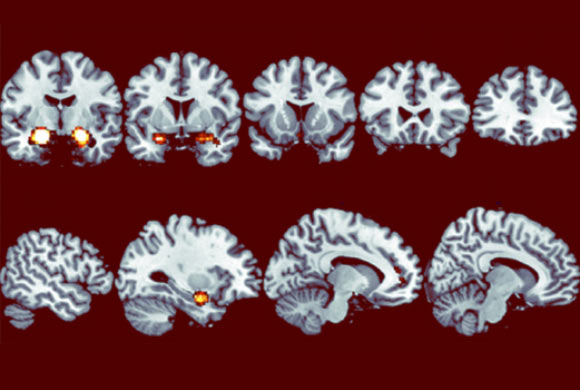A study led by University College London researchers Neil Garrett and Tali Sharot provides the first empirical evidence that self-serving lies gradually escalate and reveals how this happens in our brains.
“Dishonesty significantly impacts our personal lives and public institutions,” said Dr. Sharot, Dr. Garrett and their collaborators from the University College London and Duke University.
“We provide empirical evidence that dishonesty gradually increases with repetition when all else is held constant.”
“This experimental result is consistent with anecdotal observations of small digressions gradually snowballing into larger ones.”
The authors scanned volunteers’ brains while they took part in tasks where they could lie for personal gain.
They found that the amygdala, a brain area intricately involved in emotional responses, was most active when people first lied for personal gain. The amygdala’s response to lying declined with every lie while the magnitude of the lies escalated.
The team also found that larger drops in amygdala activity predicted bigger lies in future.
“Using functional magnetic resonance imaging (fMRI), we show that signal reduction in the amygdala is sensitive to the history of dishonest behavior, consistent with adaptation,” the scientists explained.
“Critically, the extent of reduced amygdala sensitivity to dishonesty on a present decision relative to the previous one predicts the magnitude of escalation of self-serving dishonesty on the next decision.”
“This may lead to a ‘slippery slope’ where small acts of dishonesty escalate into more significant lies,” Dr. Sharot added.
The study included 80 participants who took part in a team estimation task that involved guessing the number of pennies in a jar and sending their estimates to unseen partners using a computer.
In the baseline scenario, participants were told that aiming for the most accurate estimate would benefit them and their partner.
In various other scenarios, over- or under-estimating the amount would either benefit them at their partner’s expense, benefit both of them, benefit their partner at their own expense, or only benefit one of them with no effect on the other.
When over-estimating the amount would benefit the volunteer at their partner’s expense, people started by slightly exaggerating their estimates which elicited strong amygdala responses.
Their exaggerations escalated as the experiment went on while their amygdala responses declined.
“It is likely the brain’s blunted response to repeated acts of dishonesty reflects a reduced emotional response to these acts,” Dr. Garrett said.
“This is in line with suggestions that our amygdala signals aversion to acts that we consider wrong or immoral.”
“We only tested dishonesty in this experiment, but the same principle may also apply to escalations in other actions such as risk taking or violent behavior.”
Details of the research were published this week in the journal Nature Neuroscience.
_____
Neil Garrett et al. The brain adapts to dishonesty. Nature Neuroscience, published online October 24, 2016; doi: 10.1038/nn.4426








